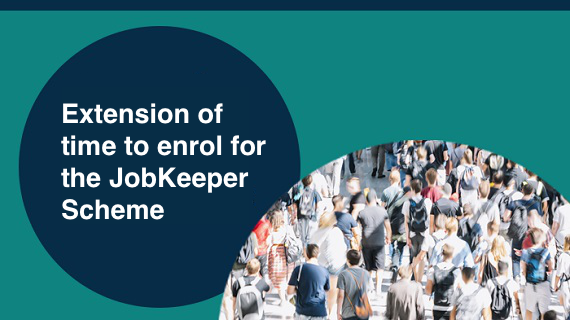Extension to JobKeeper scheme and Update of Rules
Extension of time to enrol for the JobKeeper scheme
The Commissioner has extended the time to enrol for the initial JobKeeper periods, from 30 April 2020 until 31 May 2020.
If you enrol by 31 May you will still be able to claim for the fortnights in April and May, provided you meet all the eligibility requirements for each of those fortnights. This includes having paid your employees by the appropriate date for each fortnight.
For the first two fortnights (30 March – 12 April, 13 April – 26 April), we will accept the minimum $1,500 payment for each fortnight has been paid by you even if it has been paid late, provided it is paid by 8 May 2020. If you do not pay your staff by this date, you will not be able to claim JobKeeper for the first two fortnights.
You can enrol and claim for JobKeeper earlier if you choose. For example, you can enrol by the end of April to claim JobKeeper payments for the two fortnights in April.
Update to JobKeeper rules
To ensure the integrity and the efficient operation of the JobKeeper Payment scheme, the Government is clarifying the operation of some rules:
-
Employees employed through a special purpose entity, rather than an operating entity: Changes will address the circumstances where business structures use a special purpose entity to employ staff rather than staff being directly employed by an operating entity. The Government will provide an alternate decline in turnover test for the eligibility of special purpose service entities that provide employee labour to group members and that have not met the basic test for decline in turnover. This alternate test will apply where an entity provides the services of its employees to one or more related entities, where those related entities carry on a business deriving revenue from unrelated third parties. The alternate test will be by reference to the combined GST turnovers of the related entities using the services of the employer entity.
-
Charities and the treatment of government revenue: Changes will allow charities (other than schools and universities) to elect to exclude government revenue from the JobKeeper turnover test. This will allow employing charities receiving revenue from government to use either their total turnover, or their turnover excluding government revenue, for the purposes of assessing eligibility for the JobKeeper Payment. This will help to ensure that the eligibility of charities is not adversely affected where they are delivering significant services that are funded by government.
-
Religious practitioners: Changes will allow JobKeeper Payments to be made to religious institutions in respect of religious practitioners (with the exception of those that are students only), recognising that many religious practitioners are not ‘employees’ of their religious institutions.
-
‘One in, all in’ principle: Once an employer decides to participate in the JobKeeper scheme and their eligible employees have agreed to be nominated by the employer, the employer must ensure that all of these eligible employees are covered by their participation in the scheme. This includes all eligible employees who are undertaking work for the employer or have been stood down. The employer cannot select which eligible employees will participate in the scheme. As noted in the explanatory statement to the existing rules, this ‘one in, all in’ principle is already a key feature of the scheme and will be made clearer in the rules.
-
Full time students aged 16 and 17 years old: As noted in the explanatory statement to the existing rules, the benefit of the JobKeeper payment to workers over the age of 16 is justified for those who are financially independent and who require the security provided by participation in the JobKeeper scheme and the maintenance of the working relationship that it affords. The rules will provide that full time students who are 17 years old and younger, and who are not financially independent, are not eligible for the JobKeeper Payment. This clarification will apply prospectively, which would mean an eligible employer that has already met the wage condition of paying such an employee $1,500 for a fortnight could be entitled to a JobKeeper Payment in arrears for that fortnight.
-
International Aid Organisations: Changes will allow entities that are endorsed under the Overseas Aid Gift Deductibility Scheme or for developed country relief to meet the requirement that not-for-profits pursue their objectives principally in Australia. The current requirement that employees must be Australian residents to be eligible under the JobKeeper program would remain in place.
-
Universities: Changes will clarify that the core Commonwealth Government financial assistance provided to universities will be included in the JobKeeper turnover tests.
The banks have also agreed to setup special hotlines to help businesses who need finance to bridge the gap until the first JobKeeper payments are made. The banks have also agreed to bring JobKeeper-related applications to the front of the queue and work with the ATO to accelerate the finance assessment process.
Pleae contact us on|PHONE| if you would like to discuss
Source: ATO April 2020

